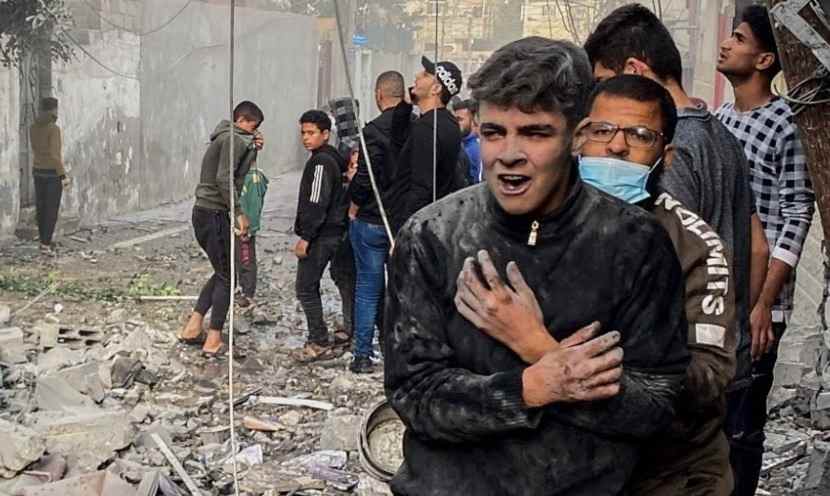Gaza's fear and anger as ceasefire ends and fighting erupts
02 December, 2023

The resumption of fighting between Israel and Hamas has been met with a mixture of fear and anger in Gaza, with the UN calling it a "nightmare".
A temporary ceasefire expired at 07:00 (05:00 GMT) with both warring sides blaming each other.
Since then, Gaza's Hamas-run health ministry says 178 people have been killed in Israeli attacks.
A UN official said much-needed aid had stopped coming through the Rafah crossing since the ceasefire ended.
On Friday morning, the sound of heavy gunfire could be heard in areas of northern Gaza infiltrated by the Israeli military, with clashes breaking out between Israeli soldiers and Hamas fighters.
There seemed to be no let up in the pace of fighting after the ceasefire, with jet fighters and reconnaissance planes deployed.
Areas targeted by air strikes included north-western Gaza and Khan Younis in the south - where hundreds of thousands of people fled earlier in the war to escape fighting in the north. Houses in the city were targeted - including one house in close proximity to Nasser hospital, where the BBC Arabic team was based.
"Around 06:30 the drones started flying," Mohammad Ghalaiyini, a Briton who is currently in Khan Younis with his family, said in a voice message sent to the BBC. "Around 07:30, I think, the bombings started and there's been like non-stop bombing every 10, 15, 20 minutes."
Leaflets dropped by the Israel Defense Forces (IDF) warned that areas east of Khan Younis and Salah al-Din were "dangerous" combat zones and urged people in some parts to head to shelters further south in Rafah, close to the Egyptian border. Meanwhile, Hamas and other groups fired rockets at Israel, which deployed its Iron Dome defence system to intercept them.
The renewed clashes were "catastrophic for the people of Gaza," James Elder, a spokesman for the UN children's agency, Unicef, told the BBC.
Mr Elder said Nasser hospital - which he said was now Gaza's biggest functioning medical facility - was "wildly overflowing with children and people with wounds of war recovering from the last attack".
He said many families had been sleeping on mattresses at the hospital for weeks.
"This hospital cannot possibly cope with a surge in wounds from the battlefield with more children with burns, with those horrendous shrapnel injuries," he said.
Other UN aid agencies have described similar conditions at other hospitals.
The situation at al-Ahli Hospital in Gaza City was "like a horror movie" even before the bombing started again, World Health Organization (WHO) senior emergency officer Rob Holden said.
His team - who visited the site earlier in the week - reported patients with "the most horrific injuries" lying on floors "running with blood", while the bodies of those who had been killed were lined up in the car park outside.
The WHO says only 18 of Gaza's 36 hospitals are "minimally to partially functional".
"Gaza's health system has been crippled by the ongoing hostilities," Richard Peeperkorn, the WHO's representative in the Palestinian territories, said. "We are extremely concerned about the resumption of violence."
There is also major concern over the wider humanitarian situation in Gaza, which is likely to worsen as fighting resumes.
As supplies of cooking gas, food and water are dangerously low, shops are empty and there is not enough aid to distribute to displaced people.
Many are sleeping in tents and have told the BBC they are struggling to cope with the cold weather conditions. They are desperately urging for more aid including warm clothing to be delivered.
They also say very little water, food and medicine is reaching hospitals.
Philippe Lazzarini, the head of the UN's relief agency for Palestinian refugees, Unrwa, said he was beyond mere concern that "no humanitarian aid has been allowed into Gaza today including fuel".
Hundreds of trucks carrying aid were able to enter Gaza during the seven-day ceasefire but they were still fewer in number than the roughly 500 trucks that entered Gaza every day before the war.
On Friday Mark Regev, senior adviser to the Israeli prime minister, said Hamas could have ensured the pause in fighting was extended if they had freed more hostages.
"They have close to 20 women [eligible for release] in the framework of the existing agreement, yet they chose not to do so," Mr Regev told the BBC.
Asked whether those women were civilians or Israeli soldiers, Mr Regev said some of the women were in their 20s and had finished their military service.
For its part, Hamas says it did make several offers regarding further hostage releases - all of which were rejected by Israel.
The Israel Defense Forces (IDF) said its military strikes on Friday had hit Hamas command centres, underground sites and groups of Hamas fighters.
Officials in Gaza say more than 14,800 people including about 6,000 children have been killed since Israel began its military campaign against Hamas there, with thousands more believed to be dead under rubble.
It follows Hamas's attack on Israel on 7 October during which it killed about 1,200 people and kidnapped 240 others.
Source: www.bbc.com
